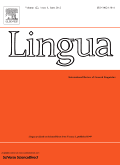
LINGUA
Scope & Guideline
Connecting scholars through groundbreaking linguistic studies.
Introduction
Aims and Scopes
- Language Acquisition and Development:
Research in this area focuses on how individuals, particularly children and L2 learners, acquire language skills. This includes the study of grammatical structures, phonetic development, and cognitive processes involved in language learning. - Sociolinguistics and Language Variation:
This scope examines how language interacts with social factors such as identity, culture, and community dynamics. Studies often explore language use in various social contexts, including dialectal variations and the impact of multilingual environments. - Corpus Linguistics and Computational Analysis:
The journal emphasizes the application of corpus-based methodologies to analyze language use across different genres and contexts. This includes the study of collocations, syntactic structures, and semantic frames based on large linguistic datasets. - Pragmatics and Discourse Analysis:
Research in this domain investigates how context influences meaning in communication. This includes examining speech acts, politeness strategies, and discourse markers across different languages and cultures. - Morphosyntax and Syntax:
The journal publishes studies that delve into the structural aspects of language, including the interplay between morphology and syntax, as well as cross-linguistic comparisons of syntactic phenomena. - Psycholinguistics and Neurolinguistics:
This area focuses on the cognitive processes underlying language comprehension and production, exploring how language is represented and processed in the brain. - Language and Technology:
Research exploring the intersection of language and technology, including studies on language processing in artificial intelligence, translation technology, and the impact of digital communication on language use.
Trending and Emerging
- Multilingualism and Language Contact:
Research focusing on multilingual contexts and the effects of language contact is on the rise. This includes studies on code-switching, translanguaging, and the impact of globalization on language use. - Language and Identity:
Emerging themes explore the intricate relationship between language and identity, particularly in diasporic communities and among speakers of minority languages. This trend highlights the role of language as a marker of cultural and social identity. - Experimental and Cognitive Approaches to Language:
There is an increasing emphasis on experimental methodologies, including eye-tracking and ERP studies, to investigate cognitive processes involved in language comprehension and production. - Digital Communication and Language Use:
Research examining the influence of digital media on language practices is becoming more prevalent. This includes studies on social media language, online discourse, and the evolution of language in digital contexts. - Pragmatics in Contextualized Settings:
Emerging studies are focusing on pragmatics within specific contextualized settings, such as business communication and e-commerce, emphasizing the practical application of linguistic theories. - Language and Emotion:
An increasing number of studies are exploring the intersection of language and emotion, particularly how emotional expressions are linguistically constructed and understood across different cultures.
Declining or Waning
- Traditional Syntax Studies:
There has been a noticeable decrease in publications solely dedicated to traditional syntactic theories without empirical grounding. The journal's focus is shifting towards more integrative approaches that combine syntax with other linguistic fields. - Historical Linguistics:
Research related to historical linguistics and diachronic studies has seen a decline, possibly due to the increasing emphasis on synchronic analyses and contemporary language use. - Phonetics without Contextual Analysis:
Studies focusing purely on phonetic descriptions, without integrating sociolinguistic or psycholinguistic perspectives, are becoming less frequent. The trend is moving towards more comprehensive analyses that connect phonetics with broader linguistic phenomena. - Linguistic Universals:
The exploration of linguistic universals as standalone topics appears to be declining, with researchers increasingly focused on language-specific studies that acknowledge diversity rather than seeking universal principles. - Language Policy and Planning:
While still relevant, studies specifically centered on language policy and planning are less prominent compared to the surge in sociolinguistic studies that incorporate language policy as part of broader social dynamics.
Similar Journals
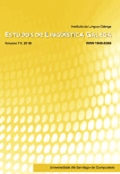
Estudos de Linguistica Galega
Highlighting the Vibrancy of Galician Linguistic PhenomenaEstudos de Linguistica Galega, an esteemed journal published by the University of Santiago de Compostela, provides a critical platform for scholars engaged in the vibrant field of linguistics, particularly focusing on the Galician language and its surrounding linguistic phenomena. Launched in 2009, this Open Access journal enables unrestricted dissemination of research, facilitating engagement from a global audience. With an impact factor that positions it within the Q4 quartile in Linguistics and Language, it reveals a strong commitment to advancing the discourse in this niche. It ranks #691 out of 1088 in the Arts and Humanities category, underscoring its relevance in the academic landscape. The journal aims to foster collaboration and innovation among researchers and practitioners, making significant contributions to understanding linguistic diversity and its implications in contemporary society. Located in Santiago de Compostela, Spain, the journal encourages submissions that explore theoretical, empirical, and applied linguistic studies, thereby inviting researchers, professionals, and students to contribute to this growing field.
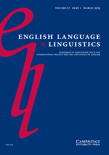
English Language & Linguistics
Fostering Scholarly Discourse in LinguisticsEnglish Language & Linguistics is a prestigious journal published by Cambridge University Press, specializing in the dynamic fields of linguistics and language studies. With an impressive Q1 ranking in both Linguistics and Language categories for 2023 and a notable placement in the Scopus metrics, where it ranks #142 out of 1088 in Arts and Humanities, the journal is recognized for its high-quality research contributions and robust impact in the scholarly community. Since its inception in 1997, English Language & Linguistics has provided a forum for researchers to explore various aspects of language, facilitating the dissemination of innovative ideas and empirical studies. With no open access options currently available, the journal remains a valuable resource within the United Kingdom and beyond, fostering a deeper understanding of language intricacies and their broader societal implications. For practitioners and academicians alike, this journal is a critical resource for keeping abreast of the latest advancements in linguistics.
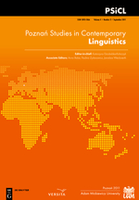
Poznan Studies in Contemporary Linguistics
Fostering scholarly discourse in language research.Poznan Studies in Contemporary Linguistics, published by DE GRUYTER MOUTON, is a pivotal journal in the field of linguistics, with an ISSN of 0137-2459 and an E-ISSN of 1897-7499. Located in Germany, this esteemed journal has consistently contributed to the academic landscape since its inception. As of 2023, it holds a Q2 category rank in Linguistics and Language and boasts commendable Scopus rankings, featuring in the 69th percentile for Arts and Humanities and the 66th percentile for Social Sciences. The journal emerges as a vital platform for scholars to explore contemporary linguistic theories and practices, making it an essential resource for researchers, professionals, and students alike. With a converged publication period from 2007 to 2024, it aims to facilitate a deeper understanding of linguistic advancements and trends. While the journal currently does not offer open access, its rigorous peer-review process ensures the highest quality of published research, strengthening its role as a leading discourse in the dynamic field of linguistics.

Journal of Comparative Germanic Linguistics
Advancing Comparative Insights in Language EvolutionThe Journal of Comparative Germanic Linguistics, published by SPRINGER, is a leading peer-reviewed academic journal that has significantly contributed to the fields of linguistics and arts and humanities since its inception. With an impressive impact factor and consistently ranked in the Q1 category in both Arts and Humanities (miscellaneous) and Linguistics and Language, this journal serves as a vital platform for scholars to disseminate their research on comparative studies in Germanic languages. The journal's scope encompasses a broad range of topics, fostering an interdisciplinary dialogue that enhances our understanding of language development, structure, and evolution. Although currently not an open-access journal, the Journal of Comparative Germanic Linguistics ensures that its high-quality articles reach a global audience, appealing to researchers, professionals, and students who are keen to explore the nuances of Germanic linguistics. With its strategic address in the Netherlands, the journal stands at the forefront of linguistic research, providing valuable insights that contribute to the academic community's knowledge base.

Onomazein
Bridging Cultures Through the Study of LanguageOnomazein is an esteemed academic journal published by the Pontificia Universidad Catolica de Chile, Facultad de Letras, featuring a dedicated focus on the field of Linguistics and Language. With an established presence since 2011, it reaches an international audience and is recognized for its contributions within the Q2 category of Linguistics as per the latest rankings, underscoring its significance in the academic community. The journal holds a commendable position in Scopus, ranking 470th out of 1088 in Arts and Humanities and 549th out of 1167 in Social Sciences, reflecting its relevance and impact in the domain. Although it does not currently offer an open access option, Onomazein remains a critical platform for researchers, professionals, and students seeking to advance their understanding of linguistic phenomena and engage with contemporary debates in language studies. For submissions and more information, please refer to the university’s address at AV Vicuna Mackenna 4860, Santiago, Chile.

Annual Review of Linguistics
Synthesizing Knowledge for Tomorrow's LinguistsAnnual Review of Linguistics is a premier scholarly journal dedicated to advancing the field of linguistics through comprehensive and insightful reviews of current research and emerging trends. Published by ANNUAL REVIEWS, this journal is recognized for its high impact, evidenced by its Q1 ranking in the Linguistics and Language category and exceptional placements in the Scopus Ranks, positioning it in the top 2% of its field. Since its inception in 2015, the journal has served as a vital resource for researchers, professionals, and students seeking to deepen their understanding of language theories, acquisition, processing, and sociolinguistics. With no Open Access currently available, the Annual Review of Linguistics is esteemed for its rigorous peer-reviewed articles that synthesize a wealth of knowledge, making it an indispensable tool for advancing research and dialogue within the linguistic community.
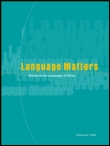
Language Matters
Transforming Perspectives on Language AcquisitionLanguage Matters is a prestigious journal dedicated to the dynamic field of Linguistics and Language, published by Routledge Journals, Taylor & Francis Ltd in the United Kingdom. With an ISSN of 1022-8195 and an E-ISSN of 1753-5395, this journal serves as an essential platform for scholars seeking to explore the multifaceted relationships between language and society. Recognized in the 2023 Category Quartiles as Q2 in Linguistics and Language, it boasts impressive Scopus rankings, sitting at #298 out of 1088 in the Arts and Humanities category and #356 out of 1167 in Social Sciences, highlighting its significant impact on the field with a 72nd and 69th percentile ranking, respectively. The journal's scope encompasses a wide range of topics including language acquisition, sociolinguistics, and psycholinguistics, making it a vital resource for researchers, educators, and students alike. By not offering open access, it maintains a curated selection of high-quality peer-reviewed articles, ensuring that academic rigor and relevance are upheld for its readership. With a publication range spanning from 1993 to 2024, Language Matters continues to shape conversations and advance knowledge in the ever-evolving landscape of linguistic research.
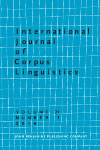
International Journal of Corpus Linguistics
Pioneering Research in Corpus LinguisticsThe International Journal of Corpus Linguistics, published by John Benjamins Publishing Co, is a premier academic journal dedicated to advancing the field of corpus linguistics. With an ISSN of 1384-6655 and an E-ISSN of 1569-9811, this journal serves as a pivotal platform for researchers and practitioners alike to explore the intricate relationships between language and corpora. Housed in the Netherlands and operating within the prestigious Q1 category in Linguistics and Language, the journal boasts impressive Scopus rankings, positioning it in the top percentiles of both Arts and Humanities and Social Sciences. Its commitment to rigorous peer-reviewed scholarship not only enhances understanding in the domain but also fosters collaboration among scholars. With coverage spanning from 1996 to 2024, the journal publishes cutting-edge research that contributes valuable insights into linguistic patterns and empirical studies. Whether you're an established researcher or a student embarking on your academic journey, the International Journal of Corpus Linguistics is an essential resource for anyone seeking to deepen their understanding of language through corpora.
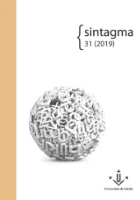
Sintagma
Championing Open Access in Linguistic Scholarship.Sintagma is a prominent academic journal dedicated to advancing the field of Linguistics and Language, published by the Universitat de Lleida in Spain. With an ISSN of 0214-9141 and an E-ISSN of 2013-6455, this journal has established itself as an open-access platform since 1989, thereby ensuring wide accessibility and dissemination of research. The journal's commitment to quality is reflected in its ranking within the Q4 quartile of Linguistics and Language in 2021 and a similar standing in Social Sciences and Arts and Humanities, which underscores its emerging importance in these fields despite recent challenges. Covering topics that span theoretical inquiries to applied linguistic studies, Sintagma invites researchers, professionals, and students to contribute to and engage with its evolving landscape from its unique academic perspective. With the convergence of research years from 2011 to 2018 and upcoming issues through 2024, the journal remains poised to provide insightful content that addresses the linguistic dimensions of contemporary society.

Voprosy Yazykoznaniya
Innovating Perspectives in Language and SocietyVoprosy Yazykoznaniya, published by the esteemed Russian Academy of Sciences and the State Academy of Humanities (GAUGN), stands as a leading journal in the field of linguistics and language studies. With an impressive Q2 rank in Linguistics and Language for 2023 and a strong position within Scopus rankings, this journal fosters scholarly dialogue and pushes the boundaries of linguistic research by providing a platform for innovative studies, reviews, and analyses. Although not open access, its publication ensures high academic standards and visibility within the global academic community. Researchers, professionals, and students alike can benefit from the rich insights and diverse perspectives presented in this journal, serving as a vital resource for anyone interested in the intricacies of language and its role in society. Operating since 2009 and continuing to 2024, Voprosy Yazykoznaniya is an essential reference point for contemporary linguistic scholarship in the Russian Federation and beyond.